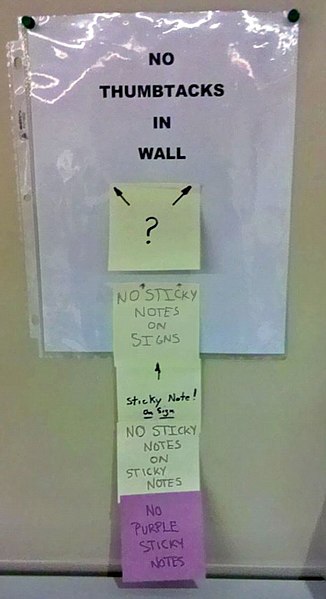Self-referential humor, also known as self-reflexive humor, self-aware humor, or meta humor, is a type of comedic expression that—either directed toward some other subject, or openly directed toward itself—is self-referential in some way, intentionally alluding to the very person who is expressing the humor in a comedic fashion, or to some specific aspect of that same comedic expression. Here, meta is used to describe that the joke explicitly talks about other jokes, a usage similar to the words metadata, metatheatrics and metafiction. Self-referential humor expressed discreetly and surrealistically is a form of bathos. In general, self-referential humor often uses hypocrisy, oxymoron, or paradox to create a contradictory or otherwise absurd situation that is humorous to the audience.
An example of self-referential humor on a shared noticeboard
A self-referencing work of graffiti apologizing for its own existence
Self-reference is a concept that involves referring to oneself or one's own attributes, characteristics, or actions. It can occur in language, logic, mathematics, philosophy, and other fields.
Drawloom, with drawboy above to control the harnesses, woven as a repeating pattern in an early-1800s piece of Japanese silk. The silk illustrates the means by which it was produced.
A self-referencing work of graffiti apologizing for its own existence
Self-referential graffiti. The painter drawn on a wall erases his own graffiti, and may be erased himself by the next facade cleaner.




